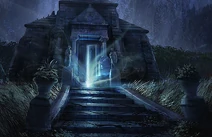Origins[]
The Dybbuk is a creature with origins in Jewish mythology, legend and folklore. In particular, it is believed that accounts of its existence first arise within writings from the 16th century.
The name 'Dybbuk' is actually a shortening of the phrase "דיבבוק מערו'אַח ראַ'אַה" (dibbuk me-ru'aḥ ra'ah, meaning "a cleavage of an evil spirit") or according to some, of the phrase dibbuk min ha-hiẓonim ("dibbuk from the outside").
However, the term did not come into more popular use among scholars until the S. Ansky play of the same name.
The existence of such a spirit helped to advocate for more orthodox shows of Jewish faith, for it was said that a sloppily made mezuzah, doubt of Moses' parting the Red Sea, or any other sign of lacking devotion to the Jewish tradition, was a potential invitation to be possessed by a Dybbuk.
This often leads to confusion among scholars: some believe that it is a demon, while others think it no more than the spirit of a deceased person, fleeing the justice of punishment in the afterlife.
Appearance[]
A Dybbuk's appearance is perhaps among its most disturbing traits. While many malevolent spirits remain invisible or take on the form of some hideous monster, the Dybbuk looks very much like a human.
In fact, it often resembles a person familiar to the community it invades; perhaps a beloved pillar of the community, a neighbor or relative of the person it attacks, or a close friend or even a lost love.
Their expression is often one of intense and permanent anger, despair or deep, longing loneliness.
Behavior[]
The behavior of a Dybbuk can best be described as negative. This may vary anywhere along the emotional spectrum, but somehow it's feelings, motivations and actions always stem from a negative place.
If it is happy, it is because it managed to escape the justice of the afterlife that awaits it, or because of the misery it's managed to cause its victim. If it is sad, then it is recalling the slights it suffered in life, and reliving them over and over.
If it is angry, it has not forgiven the wrongs done to it, or believes that it does not deserve punishment in the afterlife. If it is afraid, it fears that it will be cast out, and delivered to the otherworldly punishment that awaits it, when its divine pursuers manage to catch up to it.
The Dybbuk is not a creature that seeks to make friends, or find love, or bring about peace or happiness. It does not care for justice or truth or honesty. It seeks only to continue in a life that has since passed it by, clinging to whatever host it can, for as long as it can. No ounce of pity crosses its mind, even as the victim spirals into despair, depression, madness and often death.
While not every Dybbuk displays outright malice toward those around it (and many are simply frightened and dismayed about their supernatural state), many have been known to pose untold danger to their host. They can be anywhere from cowardly and cunning to ruthless and sadistic.

